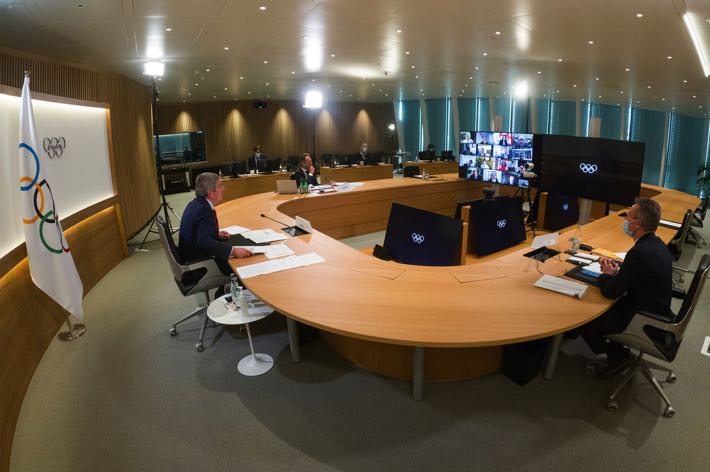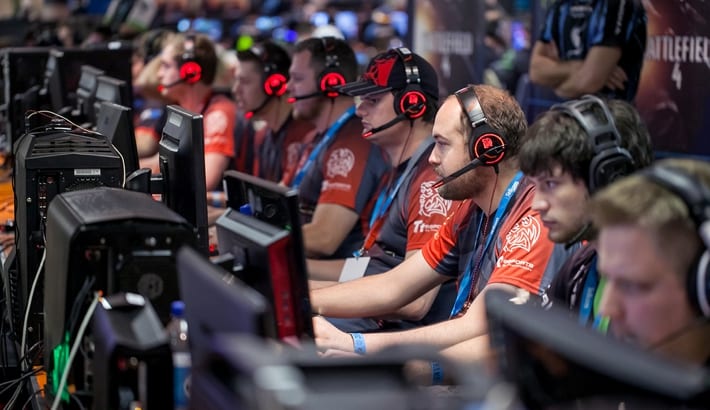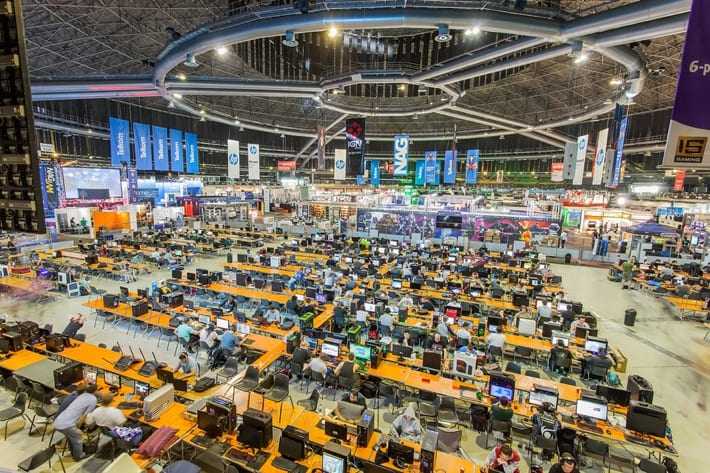 Elsewhere on this site, you can read articles both about weird sports that have been part of the Olympic Games over the years, as well as explorations of what actually makes something a sport in the first place. Now a question has arisen that seems to cover both bases, with many asking whether or not eSports are ever likely to join the Olympic roster. It is something that the International Olympic Committee, the body that decides which sports will take place during the Olympic Games, first began considering back in 2016.
Elsewhere on this site, you can read articles both about weird sports that have been part of the Olympic Games over the years, as well as explorations of what actually makes something a sport in the first place. Now a question has arisen that seems to cover both bases, with many asking whether or not eSports are ever likely to join the Olympic roster. It is something that the International Olympic Committee, the body that decides which sports will take place during the Olympic Games, first began considering back in 2016.
For some, the Olympics should only welcome ‘real’ sports into its organisation, which begs the question as to whether or not eSports fall into that category. For others, there is no question that they are sports, but is it right that they see medals awarded to the best of the best in the field when the likes of squash is still not an Olympic sport, hundreds of years after its invention. Of course, what actually makes something a sport is almost as much of a philosophical discussion as a practical one, which is why there is unlikely to ever be a consensus over the likes of eSports.
What Are eSports?
The first place to start when discussing the topic of whether eSports will ever join the Olympics is by outlining exactly what it is that we mean by ‘eSports’. Short for ‘electronic sports’, eSports are effectively competitive video games. Often these take the form of multiplayer games that are played between professional teams, which has become extremely popular since the proliferation of online gaming and the ability for those taking part in them to stream their activities online. This took such games to a whole new audience.
The world of eSports has really taken off since the 2010s, which was the decade in which game developers began to design tournaments and provide funding to allow them to take place. What might seem counter intuitive to many people is the fact that the games that are most commonly played in eSports tournaments are not sports games, but instead tend to be either Multiplayer Online Battle Areas, First Person Shooters, Battle Royale or Real Time Strategy games. So, it is that the likes of League of Legends, Counter Strike, StarCraft and Street Fighter are popular eSport games.
The IOC’s ‘Road Map’

In February of 2021, the Executive Board of the IOC published a ‘road map’ for the future of the organisation, which it entitled ‘Olympic Agenda 2020 + 5’. It boasted 15 recommendations, amongst which was the idea that the Olympic Games should be ‘engaging with the largest possible audience’. Given ‘there were an estimated 197 million Esports enthusiasts’ in 2021, that is a pretty large audience for the IOC to engage.
Indeed, the ninth recommendation as part of the IOC’s road map spells this out quite clearly, bearing the title ‘Encourage the development of virtual sports and further engage with video gaming communities’. It is hoped that doing so would allow the Olympic Games to ‘grow direct relations with you’, given the fact that it is young people that tend to be most commonly involved with the world of eSports. In fact, the recommendation goes one step further, stating, “Consider the addition of physical virtual sports in the Olympic Programme”.
Though the road map seems to suggest that there is a clear line for eSports to follow if they are to become an Olympic sport, it is worth bearing in mind that the recommendation also differentiates between it and other sports. Part of the hope is that engaging the eSport community will ‘encourage youth to engage in physical activity’, which those playing eSports don’t really tend to do. That being said, the IOC also acknowledge that there is a difference between ‘on the one hand the two forms of virtual sports and on the other hand video gaming’.
There are, the road map points out, both physical and none physical virtual sports, as well as both competitive gaming and the casual version of it. In order to be included in the Olympic Games, it is likely that eSports will have to prove that it is physical and competitive, rather than just something that can be looked upon as nothing more than a casual activity. Of course, that is the sort of thing that eSports enthusiasts have been battling against ever since the ‘sport’ broke into the mainstream, so it isn’t anything new.
The Olympic Virtual Series
If you wanted a sign of how seriously the International Olympic Committee is taking the rise of eSports, you need look no further than the launch of the Olympic Virtual Series. It was launched on the 13th of May, 2021 in the build up to the Summer Olympics of 2020, which was delayed because of the worldwide health crisis. There were five different events, which offered various concepts and forms. The events were as follows:
- Baseball
- Cycling
- Rowing
- Sailing
- Motor Sport
The aim of the Virtual Series was to combine the world of physical sport with that of virtual and simulation sports. Obviously these differ to eSports, but it was a way of engaging the community with the Olympic Movement, which, it was hoped, would lead to more long term engagement. The mass participation series allowed people to engage at home, as well as from their training facilities. Speaking on the matter, the President of the IOC, Thomas Bach, said the following:
The Olympic Virtual Series is a new, unique Olympic digital experience that aims to grow direct engagement with new audiences in the field of virtual sports. Its conception is in line with Olympic Agenda 2020+5 and the IOC’s digital strategy. It encourages sports participation and promotes the Olympic values with a special focus on youth.
The events were run as a coordinated effort between the international federation of each sport that is recognised by the International Olympic Committee, as well as the ‘corresponding gaming publisher’. As an example, the International Automobile Federation worked with Polyphony Digital to decide that the Gran Turismo series would be the basis of the auto racing event.
Olympic eSports Week

If the Olympic Virtual Series seemed a little bit too distant from the world of eSports to get excited about, perhaps Olympic eSports Week is more of a sign that the IOC is serious about engaging with younger audiences. In June of 2023, Singapore played host to the in person finals of the Olympic eSports Series, which was a continuation of the OVS. The Week was held in partnership with the Ministry of Culture, Community and Youth, the Singapore National Olympic Committee and Sport Singapore, offering a four day festival.
Though the IOC has yet to publicly announce plans to add eSports to the official Olympic roster, there can be no doubt that there is a desire from some to ensure that the Olympic Games isn’t left behind as the rest of the world moves to modernise. The 2022 Commonwealth Games offered pilot eSports competitions, for example, whilst medals have been given out to eSports players during the Asian Games in the past. Whatever sceptics might think, the current vogue is for eSports to be taken seriously by those in positions of power. Going back to Bach, he said the following on the matter,
The first Olympic Esports Week marks an important milestone in our ambition to support the growth of virtual sports within the Olympic Movement. We believe the exciting new format of our virtual sports competition, with live finals to be staged for the first time, is an opportunity to collaborate further with esports players and to create new opportunities for players and fans alike.
The IOC Has Welcomed Other ‘Weird’ Sports
Though the instinctive reaction of many classical sports fans will be to scoff at the very notion of eSports becoming part of the Olympic Games, the reality is that the International Olympic Committee has long shown an ability to move with the times. There was consternation from some quarters when sport climbing, surfing, and skateboarding were added to the list of provisional sports for Paris 2024, which also included break dancing. Yet former Olympic medalist, Tony Estanguet, said that it would ‘enrich the Olympic programme with new sports to reach new audiences especially the youth’.
With that in mind, it is hardly surprising that those involved in eSports would be keen to see them added to the list of sports that are awarded medals at the Olympic Games. ‘Breaking’ was included in the Youth Olympic Games at Buenos Aires in 2018 and proved to be a hit, so the decision to keep appealing to the youth is hardly a surprising one. Sport climbing, surfing, and skateboarding all debuted at the Tokyo Olympics and were widely enjoyed by those that watched them, so their inclusion for 2024 is also not a shock.
Baseball and softball have been added and dropped from the roster numerous times over the years, whilst the likes of golf and rugby 7s were included in the Games that were hosted in Brazil in 2016. Tug of war was an Olympic sport up until 1924, whilst water motorsports were only dropped in 1912. In other words, there is precedent for unusual sports to be added to the list of Olympic sports, so there will be a confident amongst lovers of esports that it might well have an Olympic medal associated with it before too long.
The Future of the Olympics Might Depend on It

It is something of a sad fact to accept, but the Olympics as a sporting event just like any other. That is to say, its very existence depends on the number of people willing to watch it, which is what leads to sponsors getting involved and television companies willing to broadcast the events. If people lose interest, so too will the people responsible for financing events such as the Olympic Games, which is why ‘Change or be Changed’ was the tagline for the IOC’s exploratory work into developing the programme back in 2014.
Though older people might not understand it, eSports are incredibly popular with young people. Nearly a quarter of a million people took part in the Olympic Virtual Series, which is an audience that the International Olympic Committee knows that it needs to tap into if it is to have any real chance of success moving forwards. Though traditionalists might not like it, the reality is that embracing the likes of eSports is one of the best ways for the Olympics to assure its very existence in the future, let alone success.
As the Commonwealth Games took place in Birmingham in 2022, the Commonwealth Esports Championships took place at the same time. Although it was a separate thing, it was an indication of just how clearly the writing is on the wall for eSports and its acceptance by the wider sporting community. England versus Scotland in the Rocket League Open Grand Final might not be something that lovers of gymnastics and clean and jerk are likely to tune in to watch, but it is what young people are keen to see, which might well be what saves the Olympic Games from becoming yesterday’s news.